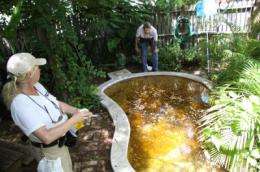UF experts urge wariness of mosquito-borne diseases this summer

For Floridians hoping that the record-breaking cold of this past winter might have stemmed the number of pesky mosquitoes, University of Florida entomologists have this message: the mosquitoes are out in full force, and so are the diseases they carry.
While the freezes may have killed a number of wintering adult mosquitoes, the insects’ eggs are capable of withstanding bad weather — meaning that it’s as important as ever to take proper precautions this Fourth of July weekend, said Roxanne Connelly, an associate professor of medical entomology with the UF’s Institute of Food and Agricultural Sciences.
“The mosquitoes are back — don’t think that the cold this winter did much to stop them,” Connelly said. “The disease season seems to be off to an early start.”
That early start includes dengue fever. As of last week, eight locally acquired cases had been reported in Monroe County at the southern tip of Florida this year.
Last year bore witness to the first cases of dengue contracted within Florida in more than 50 years. The disease is rarely fatal, but causes high fever, severe headaches as well as joint and muscle pain.
“We were hoping that it wouldn’t be very prevalent this year, but the number of cases are starting to add up,” said Coleen Fitzsimmons, a biologist with the Florida Keys Mosquito Control District, which conducts door-to-door home inspections throughout Monroe County and coordinates other large-scale control efforts, such as spray trucks.
At the moment, dengue is isolated to Key West, but that doesn’t mean that individuals throughout Florida shouldn’t take proper mosquito precautions, Connelly said.
The most recent mosquito-borne disease risk assessment from UF’s Florida Medical Entomology Laboratory reports four major areas of concern for St. Louis encephalitis and West Nile virus this year: Pinellas and Hillsborough counties; Polk, Hardee, Manatee and Sarasota counties; Hendry and Collier counties; Palm Beach, Broward and Dade counties.
Eastern equine encephalitis is a concern throughout the Florida Panhandle where several horses have contracted the disease, which can be transferred to humans.
However, concern for this disease isn’t limited to the northern part of the state. This disease is unusually widespread, said UF entomologist Jonathan Day, with more than half the cases in the southern half of Florida. For example, the disease has been detected in Martin County, where eastern equine encephalitis has not been found for more than 30 years.
Experts recommend wearing protective clothing, such as long sleeves and pants when possible, and using repellents that contain DEET as an active ingredient.
These recommendations remain true for daylight hours. Although many disease-carrying mosquitoes are only active after dark, others such as the dengue-carrying Asian tiger and yellow fever mosquitoes will bite in broad daylight.
It is also important to reduce mosquito populations around your home by eliminating standing water. Something as small as a soda can is capable of holding hundreds of mosquito larvae.
More information: For more up-to-date information on mosquitoes and what you can do to protect yourself, visit fmel.ifas.ufl.edu














